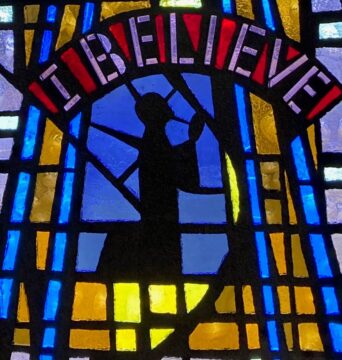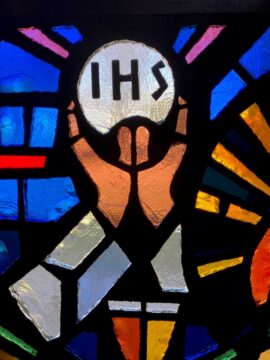Franciscan Friar Fr. Paul Gallagher reflects on the Gospel text for the Feast of the Solemnity of the Body and Blood of Christ. What are the things that nourish your soul, your spirit, and your relationship with God?
The content is edited by Franciscan Sister of Christian Charity Sister Anne Marie Lom and Joe Thiel. The excerpts from the Sunday readings are prepared by Joe Thiel. To read or download the complete pdf with excerpts for your prayer, please click here Franciscan Gospel Reflection June 11 2023. Excerpts are from the Lectionary for Mass for Use in the Dioceses of the United States of America, second typical edition © 2001, 1998, 1997, 1986, 1970 Confraternity of Christian Doctrine, Inc., Washington, DC. Used with permission. All rights reserved. No portion of this text may be reproduced by any means without permission in writing from the copyright owner. Photos: St. Olaf Parish, DeForest, Wisconsin in the Diocese of Madison Pastor is Fr. Jared Holzhuter. Come worship with this prayerful faith community for the Feast of Corpus Christi.
John 6:51-58
Jesus said to the crowds: I am the living bread that came down from heaven; whoever eats this bread will live forever; and the bread that I will give is my flesh for the life of the world.”
 The Jews quarreled among themselves, saying, “How can this man give us his flesh to eat?”
The Jews quarreled among themselves, saying, “How can this man give us his flesh to eat?”
Jesus said to them, “Amen, amen, I say to you, unless you eat the flesh of the Son of Man and drink his blood, you do not have life within you. Whoever eats my flesh and drinks my blood has eternal life, and I will raise him on the last day. For my flesh is true food, and my blood is true drink. Whoever eats my flesh and drinks my blood remains in me and I in him. Just as the living Father sent me and I have life because of the Father, so also the one who feeds on me will have life because of me. This is the bread that came down from heaven. Unlike your ancestors who ate and still died, whoever eats this bread will live forever.”
Background:
In the opening verse, Jesus identifies himself as the bread from heaven. In the next verse, he states that whoever eats his flesh and drinks his blood has life eternal. The fact that the Jews quarreled among themselves at this statement should not be a surprise. The word that Jesus used, that is translated as “eats” here, would carry a sense of gnawing, as a dog with a bone. Drinking blood was prohibited within the Jewish community. No wonder some of the Jews who were hearing this questioned his teaching. But in the gospel John often presents the questions that arise as an opportunity for further instruction.
Jesus explains, “…unless you eat the flesh of the Son of Man and drink his blood, you do not have life within you.” (John 6:51) In case they missed the point, Jesus restates this point three more times (verses 53, 54, and 55). The expression “flesh and blood” was a way to describe a human person. For those Jesus is addressing, the term “flesh and blood” would also call to mind the animals that were ritually slaughtered as offerings to God–including offerings made throughout the year, but especially those made as part of the Passover observance. Jesus is describing himself as the lamb that was killed and had its blood drained so that it could be used as a sacrificial offering. This same connection will be made later in John’s gospel when John places the hour of Jesus’ death at about the time when the lambs were being killed for the Passover observance.
For John’s community, Jesus is their food and drink. Because John’s gospel is the last written, those in the community have had more time to reflect on the significance of the Jewish tradition in light of Jesus’ life and teaching. The experience of God feeding the Jews in the desert is a familiar part of their religious tradition to help them understand God’s new revelation in Jesus. It is not enough to believe in Jesus, or even to ritually participate in the new customs of the Christian community. They are seeking to understand how God is continuing to nourish them on this, their new journey, without the familiar temple worship that was at the core of their relationship with God.
Reflection Questions:
- If someone said of another that they had put their flesh and blood into a project, how would you understand that statement? How might a pe
 rson of a different culture background misunderstand what was being said?
rson of a different culture background misunderstand what was being said? - What images come to mind when you think of flesh? What images come to mind when you think of blood?
- Have you ever had periods when you did not get enough to eat? How far back would you have to go in your family tree to a generation that truly worried about not having enough to eat? How do you think the experience of hunger affected them?
- Have there been times in your life when you felt a hunger or a thirst that was not about food or drink?
- How many times can you recall the scriptures referring to God who is feeding God’s people?
- Why would John take the time to note that the Jews quarreled among themselves over Jesus’s teaching?
- Are there aspects of God’s relationship with us that you have quarreled about?
- What are the things that nourish your soul, your spirit, and your relationship with God?
- What does this say to you about God’s desire for you?
- Can you take some time now or later today to speak to God about what this text is saying to you at this time of your life?


